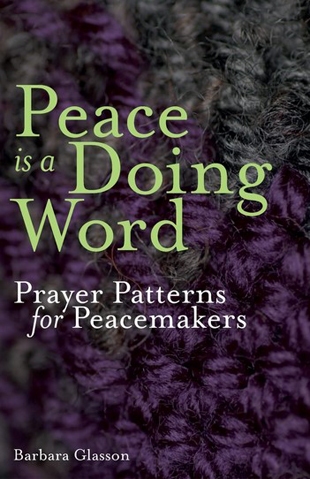This book, published by a small press in England, grabbed our attention. We’ve never seen a spiritual teacher make “peace” a verb so well — and what an important enterprise it is.
Author Barbara Glasson is a prominent Methodist minister in the UK, currently serving in Liverpool, who also works in interfaith engagement. Evidence of her commitment to religious pluralism can be found in the spiritual practice on peace accompanying this review.
She explains early on why she chose to make “peace” a verb:
“On the whole, most people think it’s a good thing; we aspire to it both for ourselves and for the world, but we are not quite sure what it actually means. ... Is peace simply absence of violence, or is it something that can be built even within conflict? Is peace something for inner tranquility, or can we be positive influences for peace in international situations? Is it anything more than an aspirational dream, or can we both grow and live peacefully?”
The book sets out to discover — through a series of practices for (1) Waking, (2) Walking, (3) Seeing, (4) Acting, (5) Creating, (6) Becoming, (7) Reflecting, (8) Resting, and (9) Blessing — how to be people of peace, and even more, in Glasson’s specific words, “to peace, to understand peace as a doing word” in creative and powerful ways.
The author includes many original and effective poems, such as this one for “Waking”:
“Spacious love,
unfold this day
as a flower
in the pavement,
with all its fragile might
grows upward,
yearning for light.
In my pressured schedule
give returning spaces,
moments to notice the tiny things,
in danger of being trampled
by my hasty feet.
May I live this day discerning
the intense immensity of
your unearned grace.”
Her teaching lessons and anecdotes are helpful too, such as this for “Becoming”:
“Let us discuss two ways to cook a chop. Firstly, I can think about half an hour before dinner time, ‘I really fancy eating a chop,’ and so, hurriedly taking it out of the fridge, I wham it under the grill and while it is sizzling, I cook some vegetables and a sauce. Job done; tea made; chop eaten. It is a perfectly respectable but not very flavoursome chop.”
“The other way goes like this: I put the chop in a deep dish at breakfast time, cover it with spices and maybe some cider or other marinade. Let it soak up all this flavor until mid-afternoon, when I place it in the oven to cook slowly and gently. This chop will be deeply soaked in all the flavours that surrounded it all day; it will be infused with complex aromas, tender and delicious.”
“It’s like this with peace. It’s not something we can cook up quickly. We need to be soaked through with the intention of it; it needs to marinate our souls; it needs to infuse every part of our lives. Such a vocation takes time. (Apologies to vegetarians, but I am not sure the analogy works so well with lentils!)”
This is an excellent book of spiritual practices and ideas for soaking yourself in peace and preparing yourself “to peace” in the world around you.
